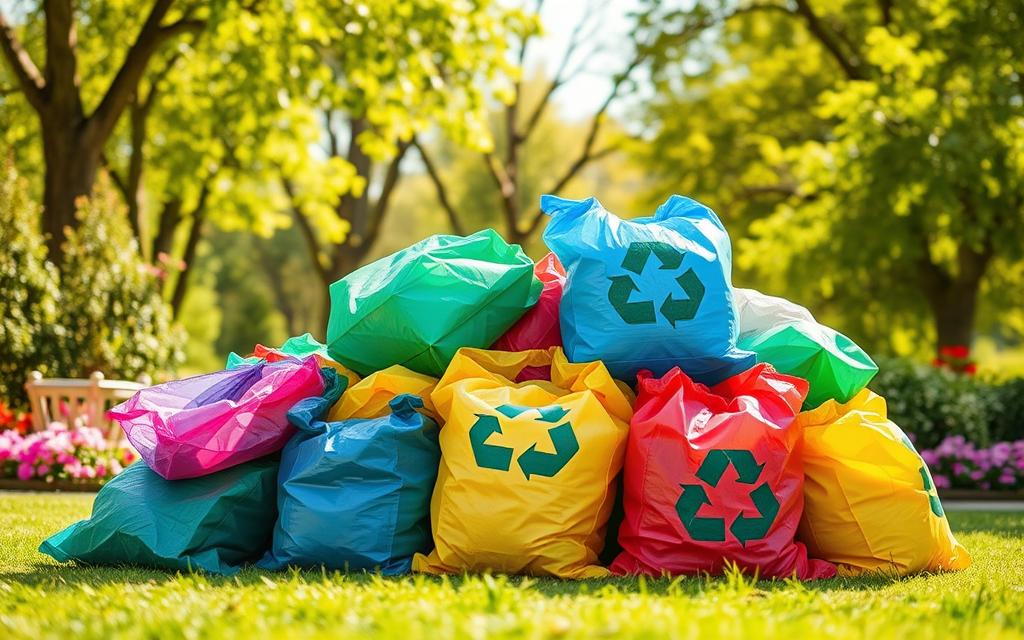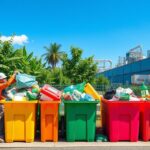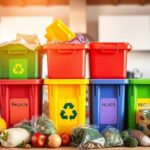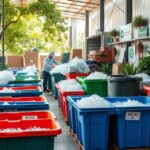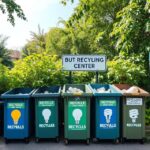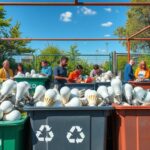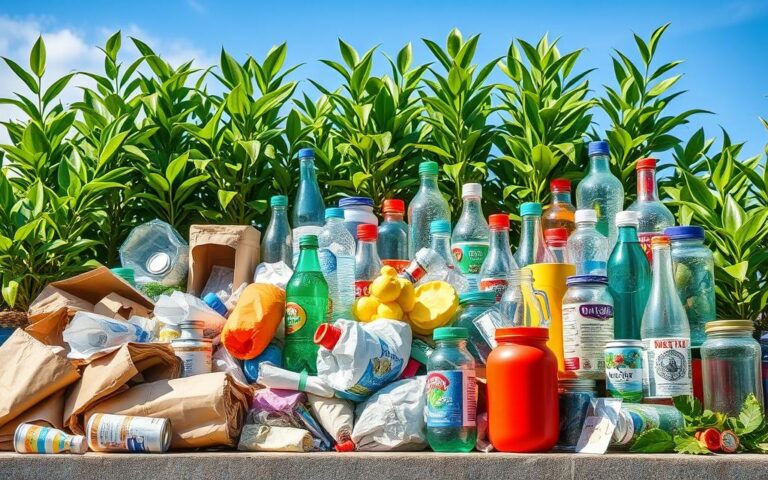Are Bin Bags Recyclable? Understanding Disposal Options
Today, with over 300 million tons of plastic waste produced yearly, we must know if bin bags can be recycled. This question sheds light on waste disposal complexities and the need for sustainable actions. Most bin bags, made of Low-Density Polyethylene (LDPE), struggle in recycling due to machinery issues.
The debate around recyclable bin bags is growing. Let’s look deeper into recycling and choose eco-friendly options for our planet.
Introduction to Bin Bags and Recycling
Bin bags are a big part of life in UK homes. They help us manage waste but can add to the plastic problem. Most people don’t know they can often be recycled. It’s important to understand how to dispose of them correctly.
Every year, we use millions of bin bags for trash. Sadly, a lot ends up in landfills, hurting the environment. The biggest issues are plastic bags and wraps. Just one dirty bottle can spoil a whole recycling load.
Sometimes, recycling isn’t straightforward. Items like envelopes with bubble wrap are a no-go. And things like Styrofoam and electronics need special treatment. For example, batteries and light bulbs have their own disposal rules.
We need better awareness about recycling. Teaching people what can be recycled reduces the harm caused by bin bags. It’s about working together to make a difference.
| Waste Type | Recyclable? | Notes |
|---|---|---|
| Plastic Bags | No | Too thin for standard recycling |
| Electronics | No | Requires special handling |
| Food Waste | No | Common contaminant in recycling |
| Clothing | No | Needs dedicated collection points |
| Medical Waste | No | Requires proper disposal methods |
| Construction Waste | No | Should be disposed of in regular trash |
Understanding the Recycling Process
The recycling process is key in handling waste well. Waste is first sorted at recycling centres. This separates things we can recycle from what we can’t. This step is crucial as it prepares for the recycling journey. Materials like paper, plastics, metals, and glass need to be sorted right. This ensures there’s little contamination.
Take paper recycling as an example. It gets cleaned with soapy water to remove things like staples and glue. Then, it’s turned into a mushy mix. This mix is the start for making new cardboard or newspapers. Plastics undergo a process of sorting, cleaning, and cutting. Then, they’re melted down to shape new products.
Metal recycling follows a unique, efficient path. Metals, such as aluminium cans, are heated and treated. Then, they’re flattened into sheets. This process lets materials be used over and over, saving costs.
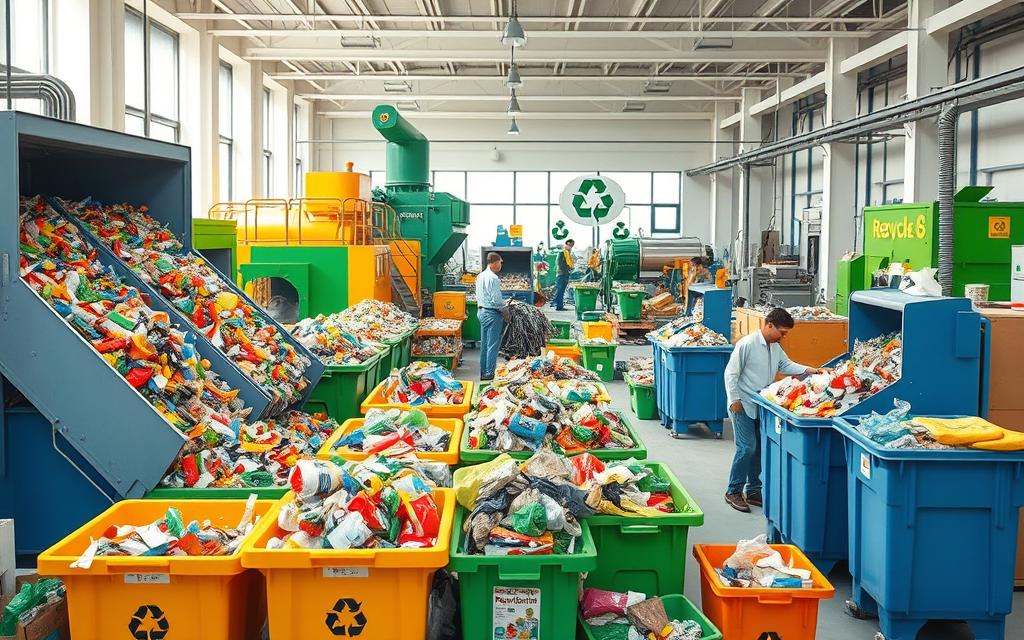
Glass recycling stands out too. It’s sorted by colour, cleaned, crushed, and mixed with things like sand. This leads to new bottles and jars. It shows recycling’s role in making new from old.
It’s vital to throw away things properly for recycling to work well. Wrong items, like bin bags, can damage machinery at recycling centres. This causes delays and problems. Knowing about waste sorting and recycling centres helps us recycle better at home.
| Material | Recycling Process | Final Products |
|---|---|---|
| Paper | Washed with soapy water, then turned into a slurry | Cardboard, newsprint, office paper |
| Plastic | Sorted, filtered, chopped, melted into pellets | Fleece fabrics, furniture, insulation |
| Metal | Heated, treated, moulded into sheets | New metal products |
| Glass | Sorted, washed, crushed, mixed with sand and other ingredients | Bottles, jars |
| E-waste | Dismantled, metals sold to smelters | Recycled metals like copper and silver |
| Textiles | Shredded into fibres, blended for new materials | Insulation, roofing felts, furniture padding |
Are Bin Bags Recyclable?
Can we recycle bin bags? It’s not straightforward. Most plastic trash bags can be recycled. Yet, they hardly ever end up in our normal recycling bins. This is because many recycling centres can’t process them. This causes big plastic recycling issues.
The Issues with Recycling Bin Bags
There’s a big problem with recycling bin bags. They can get tangled in the machines, causing them to stop. This makes costs go up and stops recycling for a while. So, most local recycling schemes say no to these bags. Instead, people should bring bin bags to special spots for recycling plastic films at supermarkets.
Common Materials Used in Bin Bags
Bin bags are usually made from Low-Density Polyethylene (LDPE). LDPE can be recycled, but it often jams the machines. It’s important to know the difference between these materials. Below, there’s a table showing the types of plastics in bin bags and if we can recycle them.
| Type of Plastic | Recycling Code | Recycling Eligibility | Common Uses |
|---|---|---|---|
| Low-Density Polyethylene | #4 | Accepted at specific drop-off locations | Trash bags, grocery bags |
| High-Density Polyethylene | #2 | Easily recyclable | Milk jugs, detergent bottles |
| Rigid Plastics | – | Acceptable in most curbside recycling | Bottles, containers |
Knowing which bin bag materials we use helps us recycle better. This reduces mistakes and keeps recycling systems working well. It’s very important for our planet.
Why Trash Bags Are Often Non-Recyclable
There are several reasons why trash bags are not often recycled. The main issues are contamination and the materials they are made from. These problems make it hard for recycling centers to process them.
Contamination and Machinery Blockages
Food residue and other waste can make bags impossible to recycle. This often leads to large amounts being thrown away. These issues not only mess up the recycling process. They can also clog machines, raising costs and reducing efficiency.
Sorting is crucial, but dirty items rarely make the cut for recycling programs.
Low-Density Polyethylene (LDPE) and Its Challenges
Low-density polyethylene (LDPE) is used in many trash bags. Although LDPE can be recycled, many programs don’t accept it. It can tangle in machines and is hard to sort from other materials.
This means even a small amount of LDPE can affect the whole recycling system.
| Challenge | Description |
|---|---|
| Contamination Issues | Residues from food and other waste leading to recycling rejection. |
| Machinery Blockages | Plastic bags causing operational disruptions in recycling facilities. |
| LDPE Challenges | Difficulties in processing LDPE due to mechanical issues. |
| Recycling Programme Limitations | Restrictions on accepting materials like LDPE affecting recycling efforts. |
Alternative Disposal Options for Bin Bags
As we become more aware of our environmental impact, finding alternatives to traditional bin bags is crucial. Many still use plastic, but there are eco-friendly choices. These include compostable and biodegradable options, as well as reusable liners, which all contribute to a smaller ecological footprint.
Compostable and Biodegradable Bin Bags
Compostable bags are good for the environment, turning into natural materials within a year. They are made from things like sugar cane, corn starch, and other surplus crops. In the U.S., look for the Biodegradable Products Institute (BPI) label to find bags fit for industrial composting. In Europe, the TUV Home Compostable Certified label means bags can break down in home compost bins. Brands such as HoldOn and Repurpose show the growing market for these sustainable products.
Reusable Liners and Their Environmental Benefits
Reusable liners are another way to reduce waste. They come in many sizes, fitting various bins, and can be used for over six weeks. This makes them a budget-friendly option.
Companies like Marley’s Monsters and TomBag make these liners from recycled materials. They’re sturdy and can be used many times. Choosing to reuse over using single-use plastics supports a greener lifestyle. Check with your waste haulers to see if you can skip liners altogether, lowering your disposable product use.
Where to Dispose of Non-Recyclable Bin Bags
Getting rid of bin bags the right way is key to helping local waste control. Non-recyclable bin bags are tricky, so knowing the best disposal spots is crucial. Check with local waste places or special recycling programs for the best advice.
Local Waste Management Facilities
Your area likely has places for throwing away non-recyclable bin bags. These spots have disposal methods that sanitation teams follow. Always check local rules on non-recyclable plastics and sort your waste correctly before you go.
- Find your nearest waste facility on your council’s website.
- Adhere to local sorting rules to help with recycling efforts.
- Drop-off points are also available for certain waste types.
Specialised Recycling Programs
Some unique recycling programs take non-recyclable plastic bags. More of these recycling initiatives are appearing to fight against plastic waste. Many grocery stores have bins where you can leave plastic bags for recycling.
| Programme Type | Acceptable Materials | Location |
|---|---|---|
| Grocery Store Drop-off | Plastic bags, film wrap | Local supermarkets |
| Community Recycling Events | Various plastics | Community centres |
| Local Recycling Initiatives | Post-consumer recycled bags | Civic offices |
Using local services and waste spots lets residents manage bin bags wisely. It helps everyone work together for a cleaner environment and better waste management.
Conclusion
The issue of bin bag recycling is complex. It shows the big challenges we face in managing waste well. In the US, only about 12% of plastic bags are recycled. This shows how important it is for everyone to know the limits of bin bag recycling. Problems like contamination and machinery blockages are big issues.
We should look towards eco-friendly options to cut down on plastic waste. Using compostable bags and reusable liners are good ways to do this. If we support local recycling programs and understand how to correctly dispose of waste, we can improve recycling in our communities.
To ensure a sustainable future, we must take responsibility for how we handle waste. Learning about how to reduce waste helps us all. Together, we can lower our plastic use and make the environment better for future generations.
FAQ
Can bin bags be recycled?
A: Some bin bags can be recycled, especially those made from LDPE. However, most facilities don’t accept them due to contamination risks and potential equipment jams.
What are the environmental impacts of using plastic bin bags?
Plastic bin bags add to global plastic waste, which is about 300 million tons a year. They can pollute the environment and harm wildlife. This shows the importance of recycling and using eco-friendly options.
How does contamination affect recycling bin bags?
Food waste and other trash inside bin bags can stop them from being recycled. This causes recyclable items to be tossed out and landfills to grow.
What alternatives are available to traditional plastic bin bags?
A: You can choose compostable or biodegradable bin bags that break down easier. Another great choice is reusable liners. They help cut down on plastic waste and are better for the planet.
Where should I dispose of non-recyclable bin bags?
Throw away non-recyclable bin bags at local garbage sites. Make sure to follow your area’s rules. Look out for special programmes that might take certain plastics.
What should I consider when choosing bin bags for my household?
Try to use biodegradable or compostable bin bags. Always check what your local recycling services allow. Using reusable liners is another good way to lessen environmental damage.
How can I contribute to responsible waste disposal in my community?
Help by taking part in local recycling efforts, pushing for better waste policies, and teaching people how to dispose of trash properly. These actions can make a big impact on keeping our planet clean.

